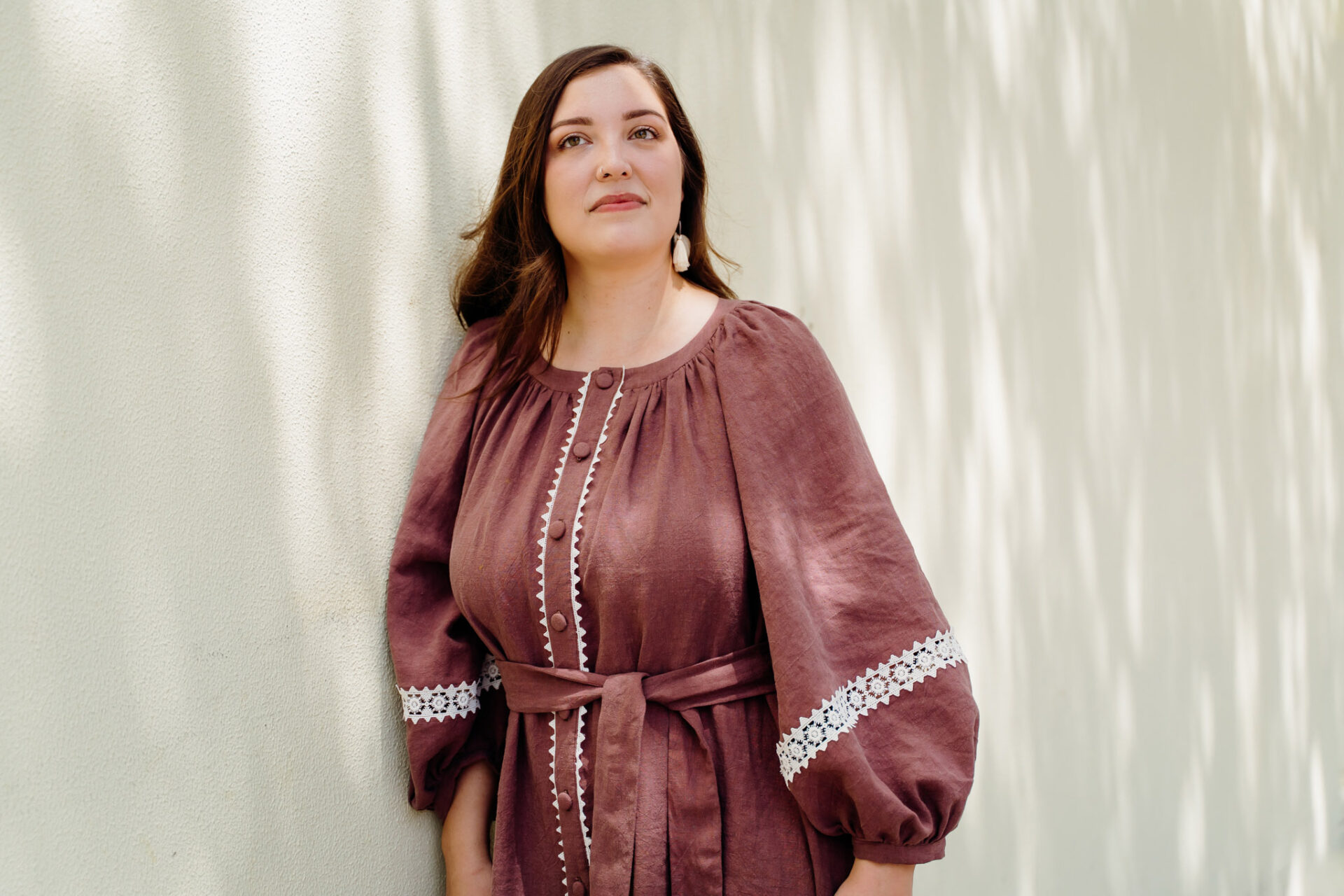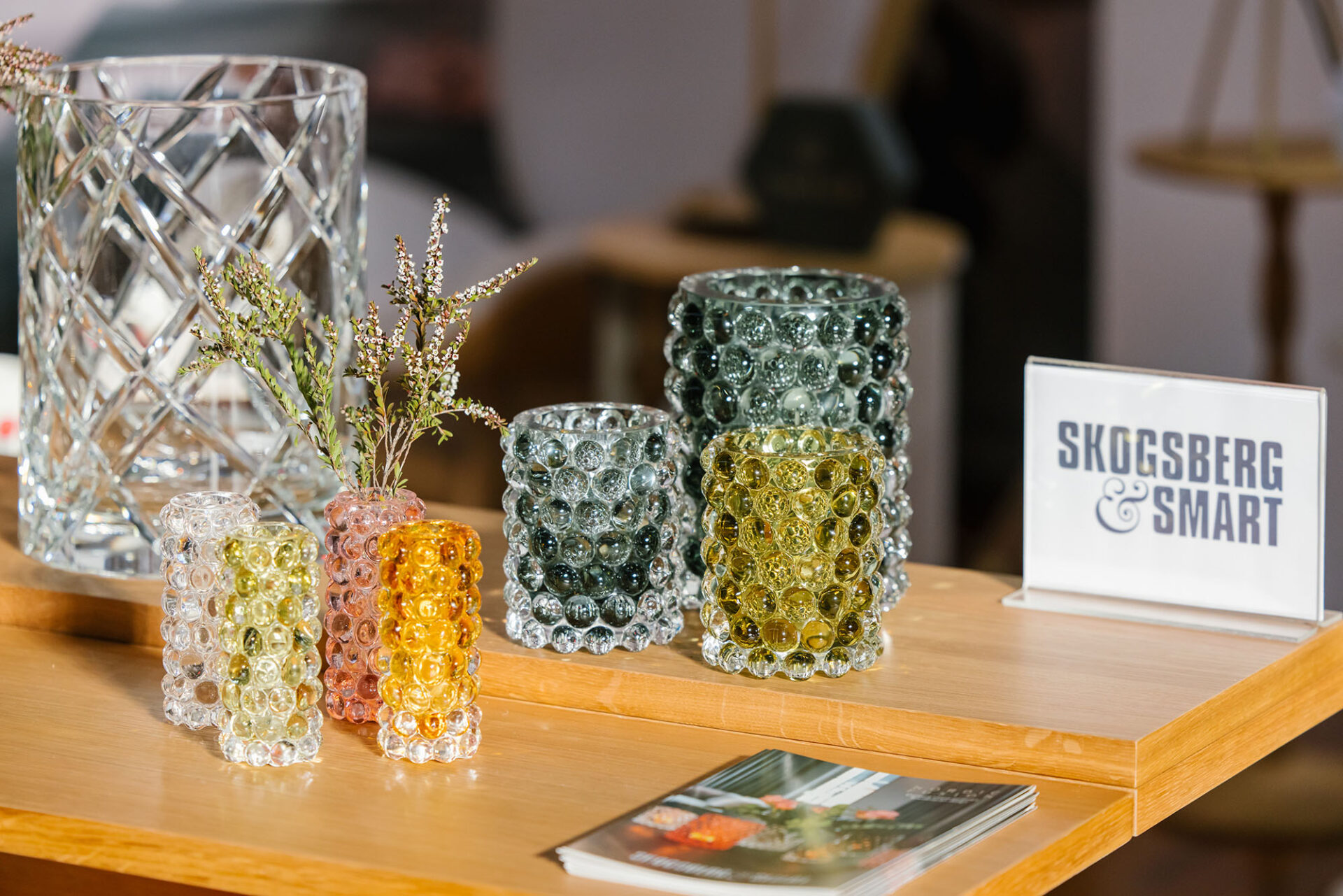On Painting Houses, Growing Into ‘Adulthood’ and Bursting the Bubble
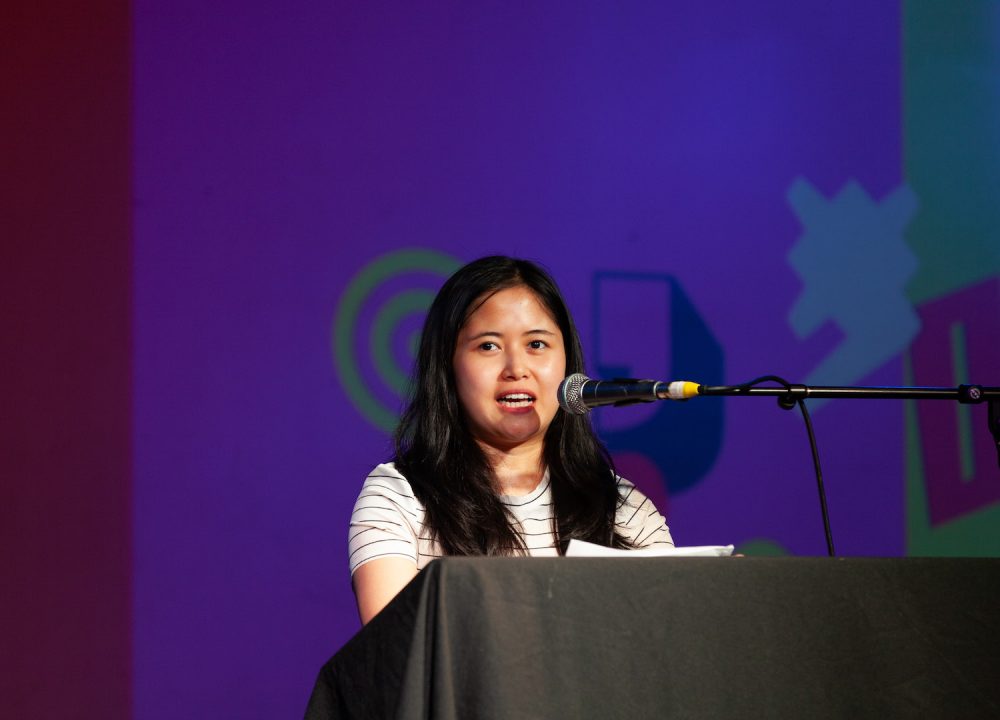
- Words by Peppermint
above KATHA VILLANUEVA SPEAKING AT GENERATION WOMEN MELBOURNE. PHOTO BY SEVIM DOGAN OZKAN
The voices of women, girls and non-binary folk have often been silenced when it comes to history, politics, science, art… well, you name it. But multigenerational storytelling night, Generation Women, is speaking truth to power, offering a warm and inclusive space where people of all ages can come together to share, celebrate and learn.
Held in Sydney and Melbourne, the monthly event aims to amplify a selection of female and non-binary voices – representing those in their twenties through to their seventies (and beyond) – each sharing their own stories on a specific theme.
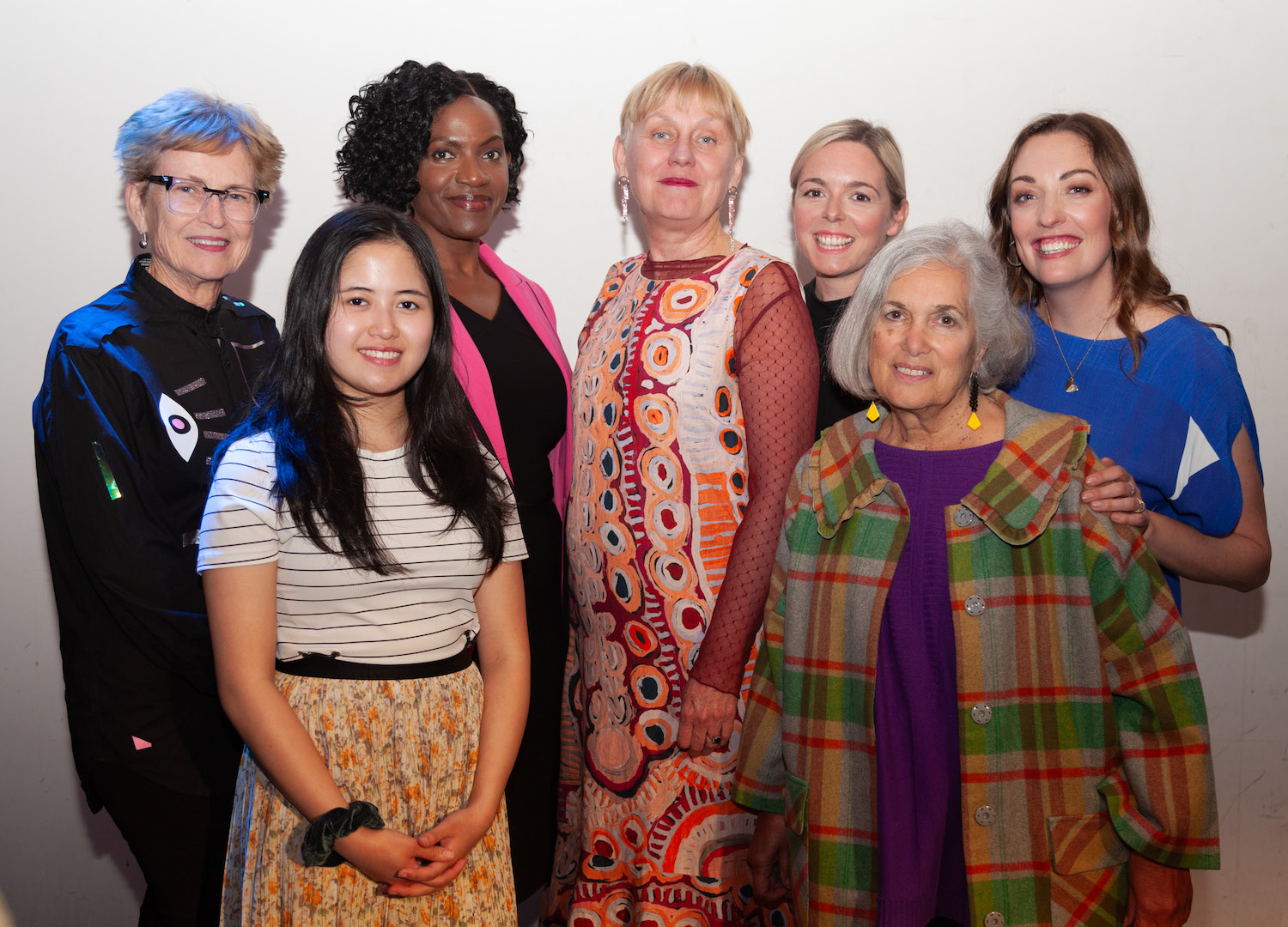
above GENERATION WOMEN MELBOURNE NOVEMBER PERFORMERS. PHOTO BY SEVIM DOGAN OZKAN
Peppermint is proud to partner with the Generation Women team to bring you a monthly series sharing the words and wisdom from some of the storytellers. November’s theme was ‘Plot Twist: Stories You Never Saw Coming’, with performers like engineer Katha Villanueva reflecting on life’s only constant – change.
For more information about Generation Women, including forthcoming events, head to their website here.
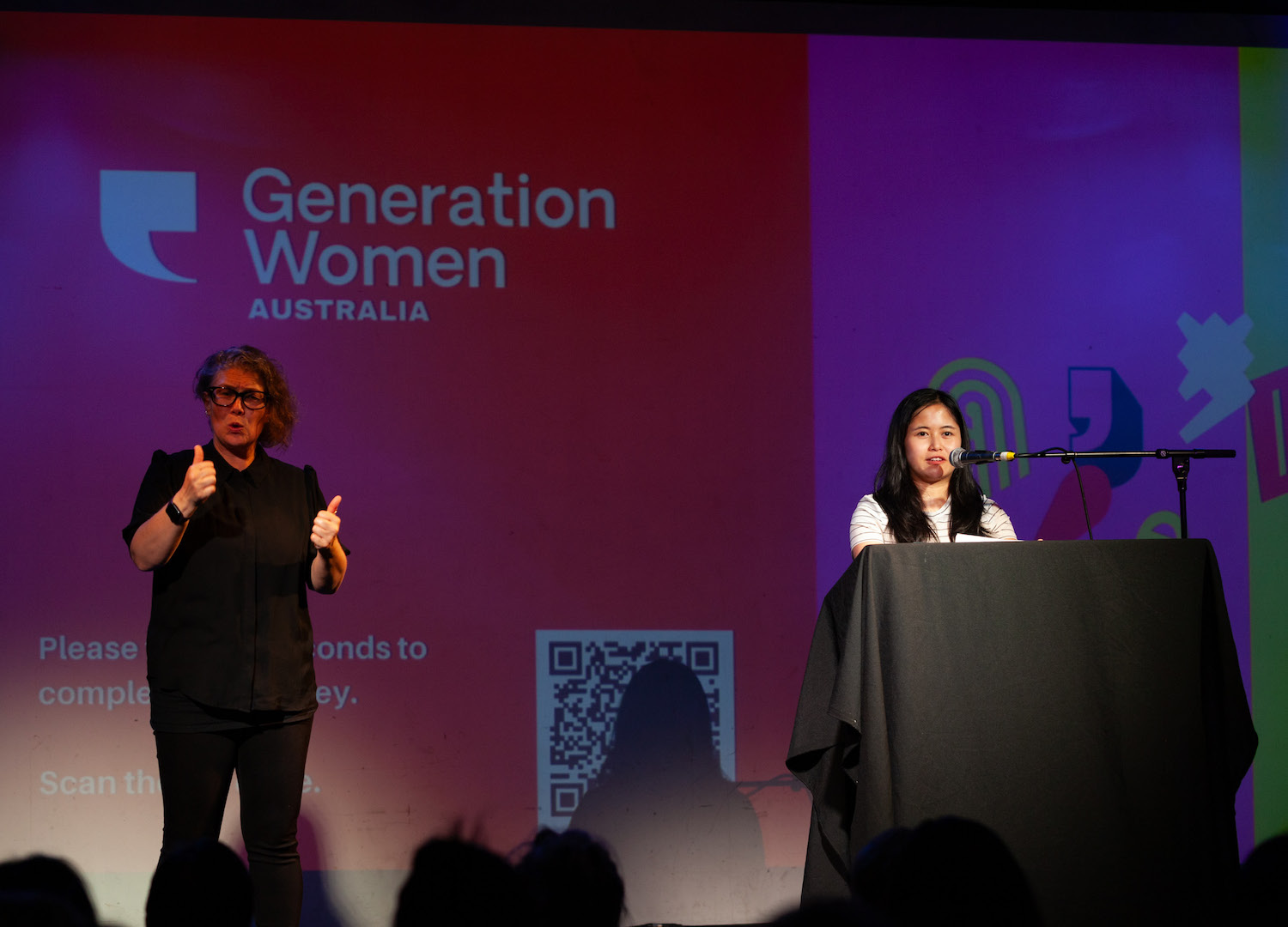
above KATHA VILLANUEVA SPEAKING AT GENERATION WOMEN MELBOURNE. PHOTO BY SEVIM DOGAN OZKAN
MELBOURNE STORYTELLER TEAM 20S: Katha Villanueva
A couple of days before I moved out of my parents’ house, I found my old high school blazer while sorting through my clothes. As I pulled it out of the closet, a puff of dust came with it. Once the blazer had been a deep black with bright green accent stitching running across the lapel, and a stiffness that only comes with new fabrics. It looked proud, then. Now, it just looked tired. The cloth had worn thin, the black fabric had greyed and moths had eaten holes through the back. The blazer had deflated, as if it had let out one long sigh and never breathed in again.
It was smaller than I remember, too. Still big – it never did fit properly, despite what the lady at the shop promised. “You’ll grow right into it, darl,” she said. “You’ve still got some growing to do.”
Looking back, I don’t have particularly fond memories of high school, but neither were they particularly bad. In fact, there is one thing I miss: the bubble. By the bubble, I mean the one that only bursts when you enter the ‘real world’. It’s a bubble that lives at the tip of a needle, precariously close to imploding and letting the world in. But it never does because the bubble is safe, protective, and yes, of course, your whole world. What else could there be? Everything outside the bubble is distant and distorted. The biggest problems of my bubble were ensuring I didn’t fail my classes or piss off the wrong girls.
Adulthood is a little like that blazer too. It’s heavy on the shoulders, long around the sleeves and I’m not growing fast enough to properly wear it.
A few years pass and I find myself at uni. I’m an ‘adult’ on paper, but I’m not sure why. Adulthood is a little like that blazer too. It’s heavy on the shoulders, long around the sleeves and I’m not growing fast enough to properly wear it. But hey I’ve got alcohol now…
University is a bubble too, but there’s something new here. There are more people, with more stories, but why does it feel different?
I decide to go volunteering with the other students and help build a house out in rural Victoria. I don’t know any of the other volunteers. The trip there is long, and we cramp together in a small rental hatchback. Bodies press against bodies as the car meanders around a bumpy road. I can smell someone’s morning breath and another person’s cologne.
The conversation is stiff and requires much effort. Once we get there and get to work, it’s easier. I’m paired with another girl to paint the inside of this half-finished house. She’s quiet but gives a polite smile when I talk to her.
“So, where are you from?” I ask.
She tells me she’s from Myanmar.
“Ah I see, did you come here with family?”
“I’ve got a brother here,” she says. “He’s studying here too.”
“Oh, so your parents are still in Myanmar?”
“Yes.”
“Must be hard to be far from family?”
READ MORE: First Dates, Fresh Eyes and New Growth: Being “My Own Damn Hero”
She pauses. I think I’ve said something wrong. Later, I wonder if maybe she was waiting for someone to ask. She tells me she had been forced to leave them behind. There was a coup in Myanmar. Her parents urged her to leave their country for any reason. Study, travel, anything as soon as possible.
“Oh god,” I say, which is stupid, but so would anything else I could’ve said.
They had to stay back, she says, they had to take care of their family, of her grandparents. She tells me she’s scared for them, and she wants to go back to them.
Now, it’s my turn for silence.
I know what a coup is, in theory. I know it likely meant the military or some force had overthrown their government, and the country is probably in disarray. I was reminded of my bubble.
Anything past the clinical definition of a coup had been blurry and distant for me. It was just a word I’d read in a school book. Until now, until this girl. She was within arm’s reach, sharing the same air, painting the same wall. Now the coup was in the room, it was in her. It was in the thickness of the paint she pushed around the wall, in the spaces between her words.
This, I thought, is adulthood. It’s gravity. The weight of everything shifted, and suddenly everything meant something.
Now I’m 23 and I can see the ripple of adulthood among my friends – how the conversations can change from boys to war in one breath. The other day a friend tells me over dinner that she has to be careful about what she posts online because of her new job. She posts a lot of social justice and humanitarian content.
The weight of everything shifted, and suddenly everything meant something.
“The boss has been known to fire people who disagree with him.”
“No way,” I say. “Surely, they can’t do that. You’ve got rights!” (Maybe this too is a remnant of the bubble.)
My friend nods. “They can claim it as a breach of social media policy,” she says.
To hold and voice an opinion is to hold and shoot a gun. Not because it’s violent, but because of its impact. The recoil. You can’t take back a bullet, and you can’t un-speak your words.
But if you don’t speak, people ask anyway, and the questions have changed since I was younger. In high school, they asked me to find the value of ‘x’. Now they ask me for the value of a human life. How much should you care about other countries? What do you consider genocide?
I ask my friend what she’s going to do about her social media posts. She says, “If they silence me, then do I really want to work for them?” She shoots these words, point blank, into my heart.
She’s got me thinking of that girl from Myanmar, painting that house. The house we built was an emergency shelter for those fleeing from domestic violence. I can’t tell if it’s beautifully poetic or just tragic. That she might build this shelter for others fleeing violence, and think of her parents back home. Or does she see herself in them?
I think if only I could be like any of these powerful women around me, then perhaps I could call myself grown. If I could throw the weight of my voice, and understand its impact, that would be something. I’m not certain how to do that yet, but I’m standing here on this stage now talking to you all, aren’t I?
READ MORE – “No One Judges the Skin I’m In”: The Sea is Salvation for This Acclaimed Author
JOIN OUR MAILING LIST
Brighten up your inbox with our not-too-frequent emails featuring Peppermint-related news, events, competitions and more!
explore
More articles
Look, I don’t want to make anyone panic but IT’S DECEMBER!!! If you’re planning to give homemade gifts, you’re going to have to act fast. …
Hang out with us on Instagram
🌻 The Paddington 🌻
This is a much-loved staple, created for Issue 50 in 2021. We love seeing the #PeppermintPaddingtonTop continually popping up in our feeds!
How stunning is our model Elon MelaninGoddessEfon – she told us it was one of the first times she had been asked to come to a shoot with her natural hair. 🌻
We worked with South African patternmaker Sarah Steenkamp of @FrenchNavyNow_ to create this wardrobe essential – the perfect puff-sleeve blouse. Raglan sleeves make it the ultimate beginner sew, plus the gorgeous back buttons let you add your own personal twist.
Pattern via the link in bio! 🪡
Photos: @KelleySheenan
Fabric: @Spoonflower
Model: MelaninGoddessEfon

“In the 1940’s, Norwegians made and wore red pointed hats with a tassel as a form of visual protest against Nazi occupation of their country. Within two years, the Nazis made these protest hats illegal and punishable by law to wear, make, or distribute. As purveyors of traditional craft, we felt it appropriate to revisit this design.”
Crafters have often been at the heart of many protest movements, often serving as a powerful means of political expression. @NeedleAndSkein, a yarn store in Minnesota, are helping to mobilise the craftivists of the world with a ‘Melt The Ice’ knitting pattern created by @Yarn_Cult (with a crochet pattern too), as a way of peaceful protest.
The proceeds from the $5 pattern will go to local immigrant aid organisations – or you can donate without buying the pattern.
Raise those needles, folks – art and craft can change the world. 🧶
Link in bio for the pattern.
Images: @Gather_Fiber @NeedleAndSkein @a2ina2 @KyraGiggles Sandi.204 @WhatTracyMakes AllieKnitsAway Auntabwi2
#MeltTheIce #Craftivism #Knitting #CraftForChange

TWO WEEKS TO GO! 🤩
"The most important shift is moving from volume-led buying to value-led curation – choosing fewer, better products with strong ethics, considered production and meaningful stories. Retailers have real influence here: what you buy signals what you stand for. At Life Instyle, this means using the event to discover and invest in small-scale, planet-considerate brands that align with your values and your customer’s conscience. Consumers don’t need more things; they need better things, and retailers play a key role in selecting, contextualising, and championing why those products matter."
Only two more weeks until @Life_Instyle – Australia`s leading boutique retail trade show. If you own a store, don`t miss this event! Connect with designers, source exquisite – and mindful – products, and see firsthand why this is Australia’s go-to trade show for creatives and retailers alike. And it`s free! ✨️
Life Instyle – Sydney/Eora Country
14-17 February 2026
ICC, Darling Harbour
Photos: @Samsette
#LifeInstyle #SustainableShopping #SustainableShop #RetailTradeEvent

Calling all sewists! 📞
Have you made the Peppermint Waratah Wrap Dress yet? Call *1800 I NEED THIS NOW to get making!
This gorgeous green number was modelled (and made) by the fabulous Lisa of @Tricky.Pockets 🙌🏼
If you need a nudge, @ePrintOnline are offering Peppermint sewists a huge 🌟 30% off ALL A0 printing 🌟 when you purchase the Special Release Waratah Wrap Dress pattern – how generous is that?!
Head to the link in bio now 📞
*Not a real number in case that wasn`t clear 😂
#PeppermintWaratahWrapDress #PeppermintPatterns #SewingPattern #WrapDress #WrapDressPattern

8 Things to Know About January 26 - from @ClothingTheGaps:
Before you celebrate, take the time to learn the truth. January 26 is not a day of unity it’s a Day of Mourning and Survival for Aboriginal and Torres Strait Islander peoples.
It marks the beginning of invasion, dispossession, and ongoing colonial violence. It’s time for truth-telling, not whitewashed history.
Stand in solidarity. Learn. Reflect. Act.
✊🏽 Blog written by Yorta Yorta woman Taneshia Atkinson.
🔗 Link in bio of @ClothingTheGaps to read the full blog
#ChangeTheDate #InvasionDay #SurvivalDay #AlwaysWasAlwaysWillBe #ClothingTheGaps

As the world careens towards AI seeping into our feeds, finds and even friend-zones, it`s becoming increasingly hard to ignore.
We just wanted to say that here at Peppermint, we are choosing to not print or publish AI-generated art, photos, words, videos or content.
Merriam-Webster’s human editors chose `slop` as the 2025 Word of the Year – they define it as “digital content of low quality that is produced usually in quantity by means of artificial intelligence.” The problem is, as AI increases in quality, it`s becoming more and more difficult to ascertain what`s real and what`s not.
Let`s be clear here, AI absolutely has its place in science, in climate modelling, in medical breakthroughs, in many places... but not in replacing the work of artists, writers and creatives.
Can we guarantee that everything we publish is AI-free? Honestly, not really. We know we are not using it to create content, but we are also relying on the artists, makers and contributors we work with, as well as our advertisers, to supply imagery, artwork or words created by humans. AI features are also creeping into programs and apps too, making it difficult to navigate. But we will do our best to avoid it and make a stand for the artists and creatives who have had their work stolen and used to train AI machines, and those who are now losing work as they are replaced by this energy-sapping, environment-destroying magic wand.
Could using it help our productivity and bottom line? Sure. And as a small business in a difficult landscape, that`s a hard one to turn down. We know other publishers who use AI to write stories, create recipes, produce photo shoots... but this one is important to us.
`Touch grass` was also a Merriam-Webster Word of the Year. We`ll happily stick with that as a theme, thanks very much. 🌿









